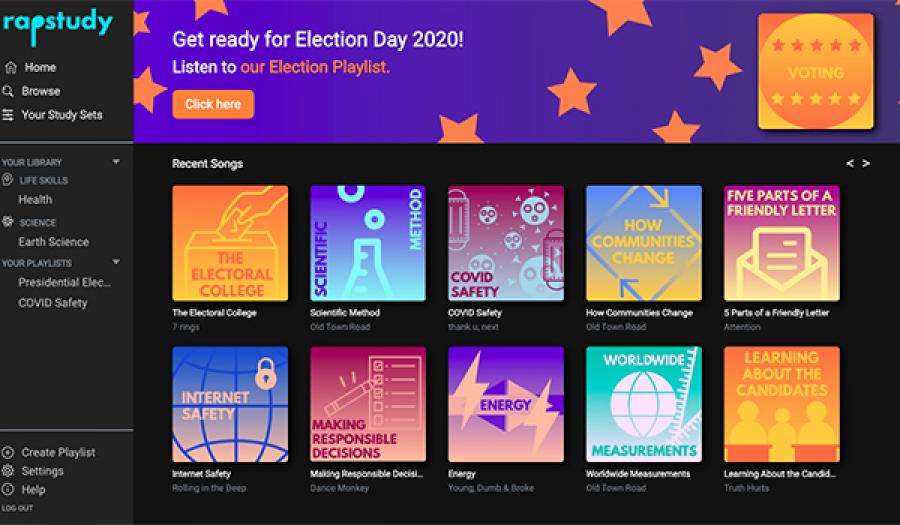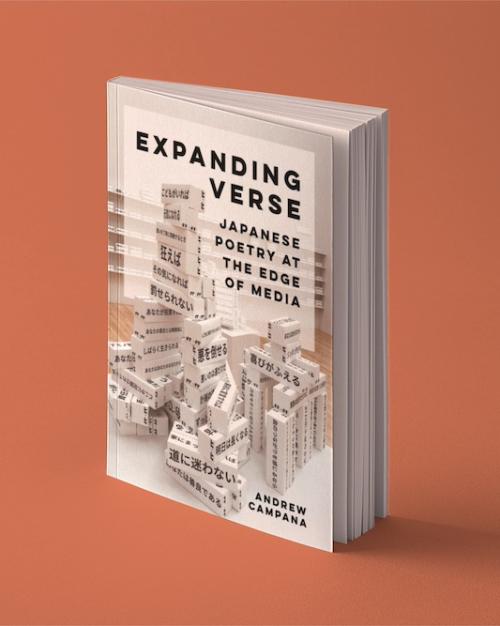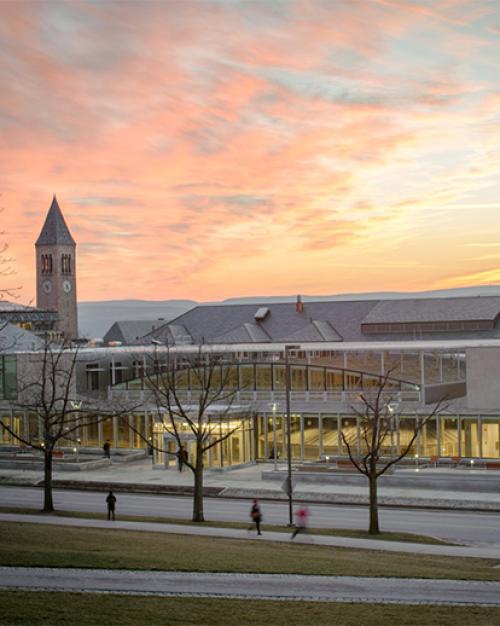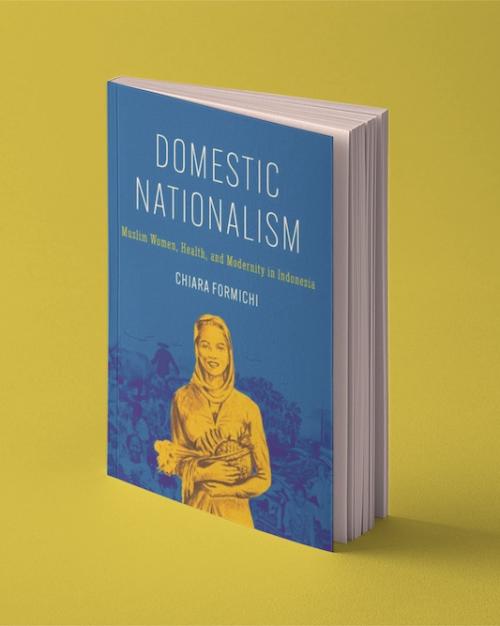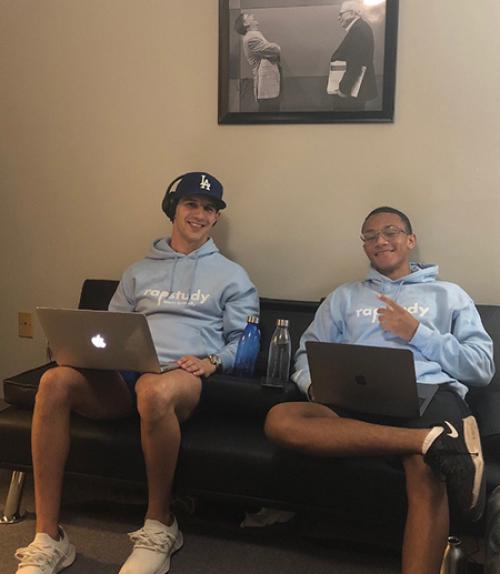Singer Ariana Grande probably never imagined that her song “7 Rings” might one day be used to help middle-schoolers learn about the electoral college. But that’s just what it’s doing in the hands of two Cornell students, Cosimo Fabrizio ‘22 and Drew Speckman ‘21, co-founders of rapStudy, which pairs popular song melodies with lyrics meant to help elementary and middle schoolers learn about everything from civics to the scientific method.
The business, launched in September, won the grand prize in the New York Business Plan Competition this spring for college businesses and the pair were named to the Beck Fellowship Program this summer. It has grown to 40 team members, including 25 Cornell undergrads and 15 Los Angeles-based musicians, and their 150 songs are currently being used by teachers in 25 schools in New Jersey, New York and Connecticut.
“We know this has the capacity to change American education by changing the relationship that kids have with the learning process,” said Fabrizio, an economics and government double major in the College of Arts & Sciences. By offering an entertaining tool to help kids stay motivated and engaged, the founders say their product also helps address inequity issues in education. “There are too many kids who don’t have access to a quality education. We're trying to work with K-8 students in particular right now in large part because we believe that early education is an important factor in setting the foundation for a happy and successful life.”
Speckman, a student in the School of Industrial and Labor Relations who is minoring in business and history, met Fabrizio through their law fraternity and they realized they had common interests in entrepreneurship, education and music. They developed the idea over a year, with help from other students, advisors in the music business and mentors at Cornell including Felix Litvinxky of Blackstone LaunchPad and Celia Bigoness, director of the Cornell Entrepreneurship Clinic at Cornell Law.
“During the meeting, (Drew) spoke eloquently and passionately about both his vision for rapStudy and about the research supporting rapStudy’s approach to education,” Bigoness said. “As soon as he left the room, the law students and I decided on the spot that we’d take on rapStudy as a client and started brainstorming about where to start.”
Bigoness and her students at the clinic helped rapStudy incorporate, protect its intellectual property, trademark its logo, develop contracts for use in partnerships with schools and develop a legal strategy for partnerships with the music business.
They also developed timely content on pressing topics, such as a number of songs related to COVID safety and a unit of songs about the election that included the Ariana Grande number.
“We wanted kids to understand that even though they’re too young to vote, there’s a lot they can do,” Fabrizio said. “If a second-grader listens to our song and goes home telling their parents to vote, we consider that a success. That's the kind of enthusiasm we hope to create about all of our subjects, in this instance, American Democracy. We want our songs to encourage kids to start asking questions: Does the electoral college make sense, what is the role of the president?”
Each song starts with a one-page document that includes all of the information that needs to be covered, either written by a teacher or based on a learning standard. That document is sent to a songwriter, who composes a lyric to the tune of a popular song and passes it along to musicians to do the recording.
“Not only does the song fit the same syllable structure and rhyme scheme as the original, but it's recorded to sound like the original artist,” Speckman said. “So, for students using rapStudy, it's as if Travis Scott or Taylor Swift is teaching them.”
“Along with the songs, their platform allows teachers to add in lesson plans, additional pictures or videos and to make practice quizzes and study aids for their students,” Speckman said.
Diane Grant, a sixth-grade science teacher at South Orange Middle School in New Jersey, used a rapStudy song to help reinforce lessons on the scientific method.
“Integrating music into my classroom setting can improve my students’ memory and recall of the targeted learning material,” she said. “My students know the lyrics to the songs they like. So, when I introduce the scientific method with music and lyrics, it helps makes the instruction more meaningful and engaging for my students.”
Set to the tune of “Old Town Road,” Grant said she played the song to introduce the steps of the scientific method and then played it when her students were entering into their Google Meets classroom (the school is all virtual these days).
She said she’ll work with the rapStudy team to see what they have related to astronomy, her next unit of study. Fabrizio was a student of hers when he was in sixth grade and she said she’s extremely proud of him.
“Not only are they starting a business, but they’re developing a product that will help students and teachers,” Grant said.
Speckman and Fabrizio said their goals for the fall include creating a mobile app and a multiplayer feature, as well as adding student accounts to the platform so that students can log in from home.
Other Cornell students on the leadership team at include Adrian Lee 22’, a computer science and economics major in Arts & Sciences, head of product; Reza Madhavan 22’, a computer science and Asian studies major and a student in the Milstein Program in Technology & Humanity in Arts & Sciences, head of tech; and Claire Choi, ’22, a design and environmental analysis major in the College of Human Ecology, design lead.
Speckman and Fabrizio said they are grateful for the Cornell community’s support and continue to welcome additional connections/resources to help further their cause of paying forward the gift of education. They can be contacted at drew@rapstudy.com and cosimo@rapstudy.com.

